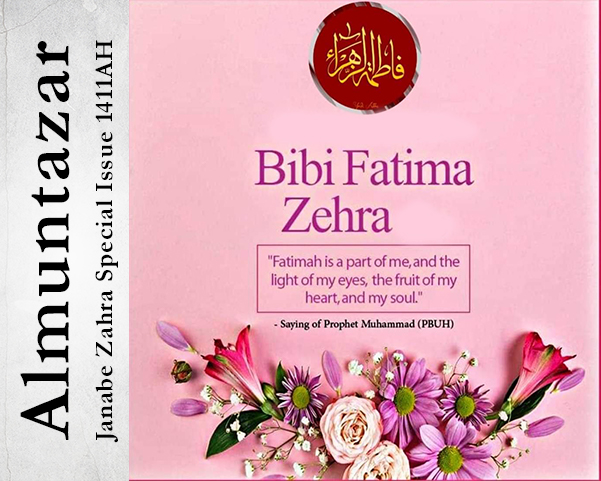Ameerul Momeneen Hazrat Ali Bin Abi Talib (a.s.) had said “Fatema (a.s.) was the most exalted and respected lady of the Prophet’s (a.s.) family. She fetched water-bags so many times that it resulted in making a mark on her chest. Moreover, she swept her house many times in a day, and operated the flour grinding stone mill for many hours, and thereby had contracted callouses on her palms. Moreover, for igniting the oven, she lit a big fire, that stained her clothes”.
In a nutshell, all these strenuous household chores were beyond her.
“Observing her slogging so hard I (Ali (a.s.)) suggested her to go to the Holy Prophet (s.a.w.a.) and request him to provide a maid to help her”.
One day she went to the Prophet’s (s.a.w.a.) house and saw that he was engaged in talking to some people. She returned to her house. But the Holy Prophet (s.a.w.a.) knew the cause of her coming. He (a.s.) went to her house and asked, “O my beloved daughter, what was the matter?”
Hazrat Ali (a.s.) related unto him the hardship Fatema (a.s.) had to face. On hearing this, the Messenger of Allah (s.a.w.a.) said, “Can I suggest you something that would be beneficial to you?” So saying, he advised that after every prayer, you should say ALLAHO AKBAR (“God is Greatest “) 34 times, SUBHAN ALLAH (“Glory Be To God “) 33 times and AL HAMDU LILLAH (“All Praise is for God “) 33 times. It shall be better than having a helper, and also from all other things of the world.
(Elal-ush Sharaye, Vol.2, page 366, and Behaar, vol. 43, page 82)
In some other traditions, much emphasis was laid to this Tasbih, apart from prayers, it was enjoined to recite this before going to bed.
According to other tradition, it was said on the authority of Imam Jafar Sadiq that this Tasbih is useful to the children as well as to the youth.
In another tradition also, it was enjoined that without reciting this Tasbih, your prayers will not be worth accepting.
In this regard, a tradition form Imam Jafar Sadiq says that to recite this Tasbih is much better than performing one thousand rakats of recommended prayers.
A Question to Conscience
The highly regarded learned man of Ahle Sunah, Imam Abu Mohammad Ibn Qutiba, wrote in his famous book, “Al Amamatawa Alsiasata”, the following incident on pages 13/14 .
- That when at the door of Janabe Fatema (a.s.), the noises of Hazrat Umar and the appointed men of the 1st Caliph were heard, the daughter of Holy Prophet (s.a.w.a.) addressed her father loudly and said that “O Father, what troubles were there that were not given to me by the son of Khattab and the son of Qahefa.”
- When Abu Bakr and Umar visited the ailing Janabe Fatema (a.s.) in her house, she turned away her face, and did not respond to their salutation, and said that have not the people heard the Prophet saying that “The pleasure of Fatema is my pleasure, and the displeasure of Fatema (a.s.) is my displeasure. Whosoever makes her wild, he made me wild. Abu Bakr and Umar said that surely they have heard it from the Prophet (a.s.).
Then Janabe Fatema (a.s.), replied that “I keep Allah and Angels as my witnesses, and said that you people have displeasured me, and when I will meet Rasoole Khuda (a.s.), I shall complain to him, and after every prayer, By Allah, I will curse you.
This incident and a renowned tradition about Janabe Fatema Zahra (a.s.) says that the Prophet (s.a.w.a.) had said that Fatema is my piece. Whosoever harms her, had harmed me, and whosoever pleases her, he had pleased me.
And the following verse of Holy Quran invites our attention and supply food for thought. It is questioning our conscience. Can we satisfy our conscience by giving false excuses?
“Those persons who have harm Allah and his Prophet, Allah, had cursed them in this world and as well as in the world of hereafter, and arranged to make them wretched.”

